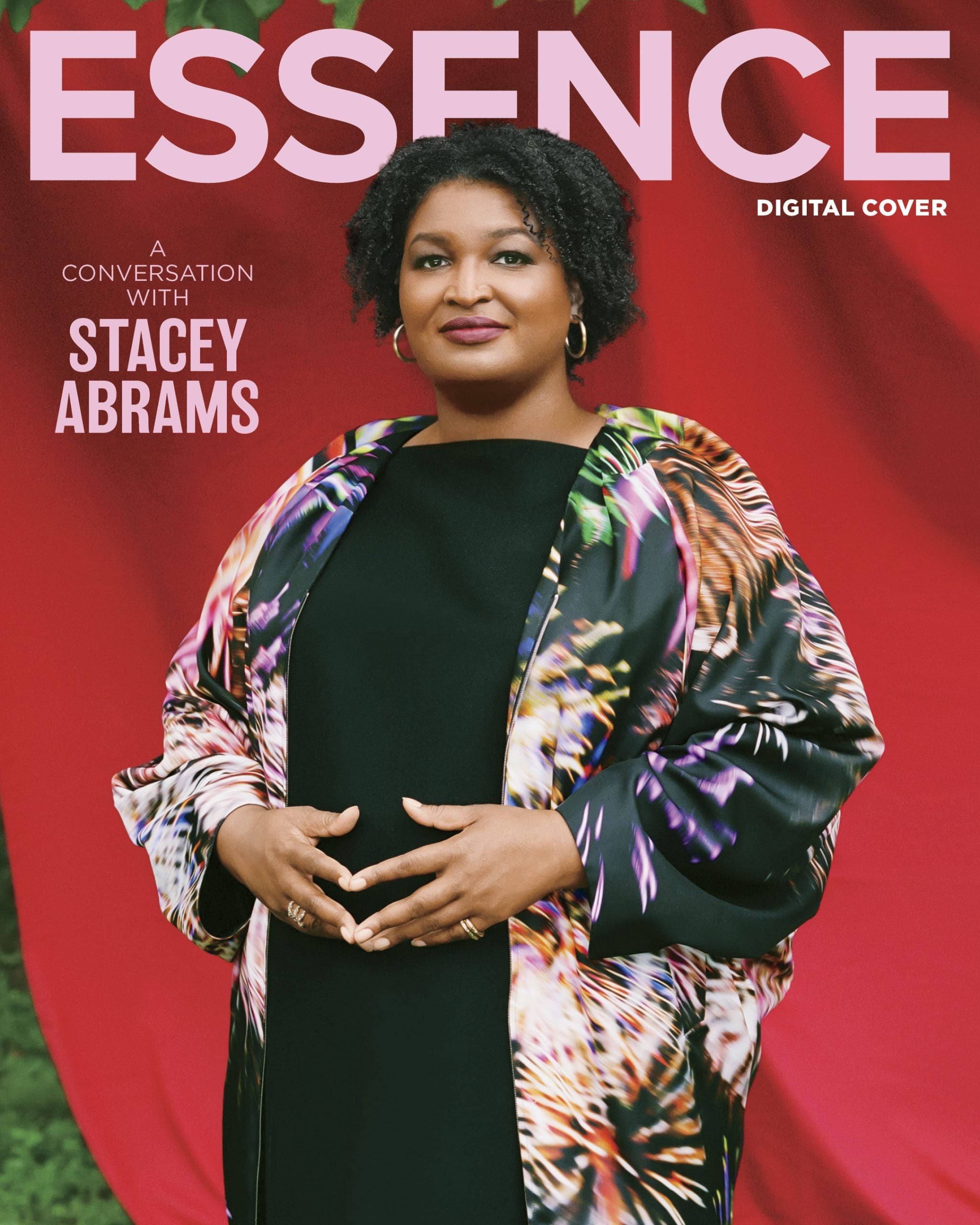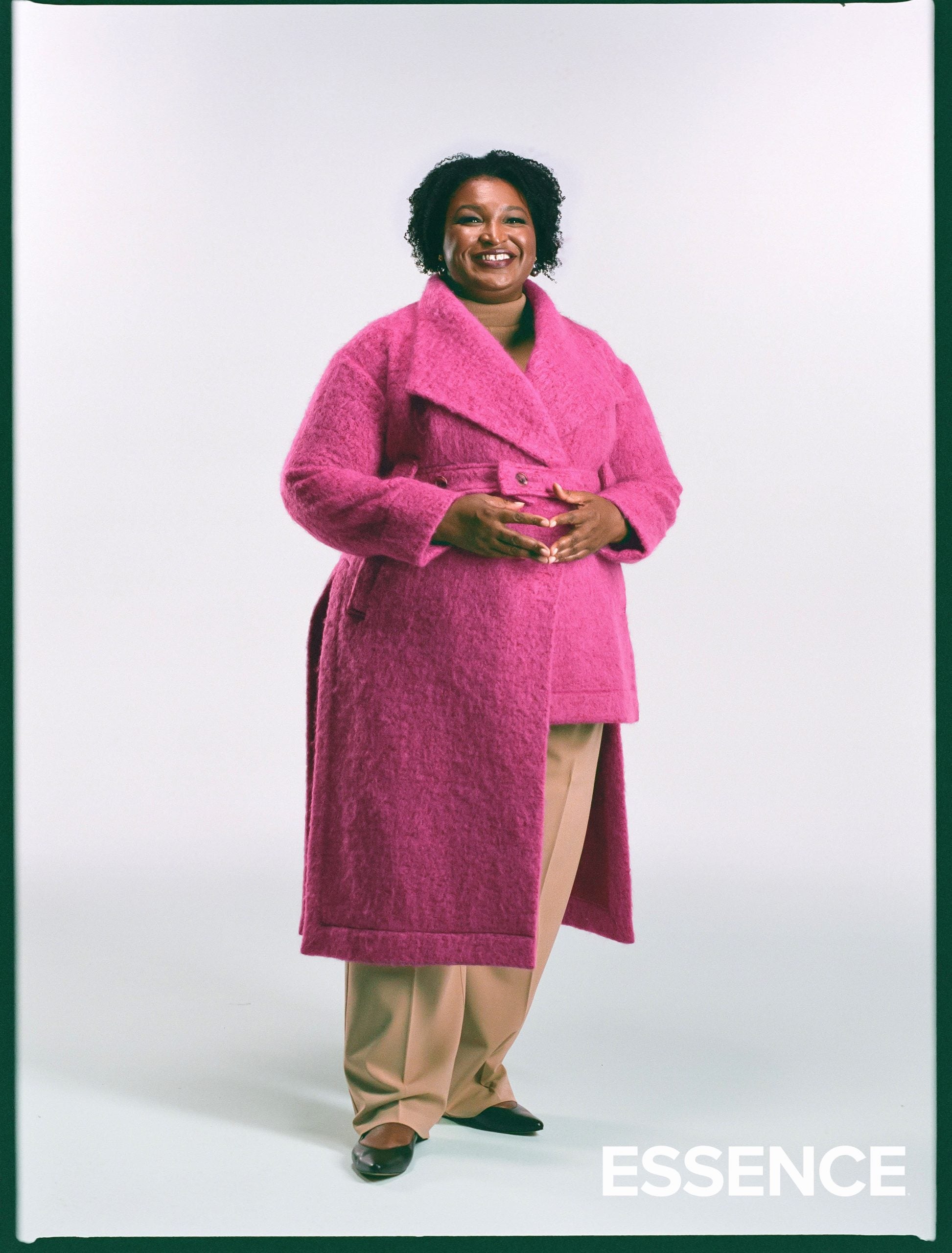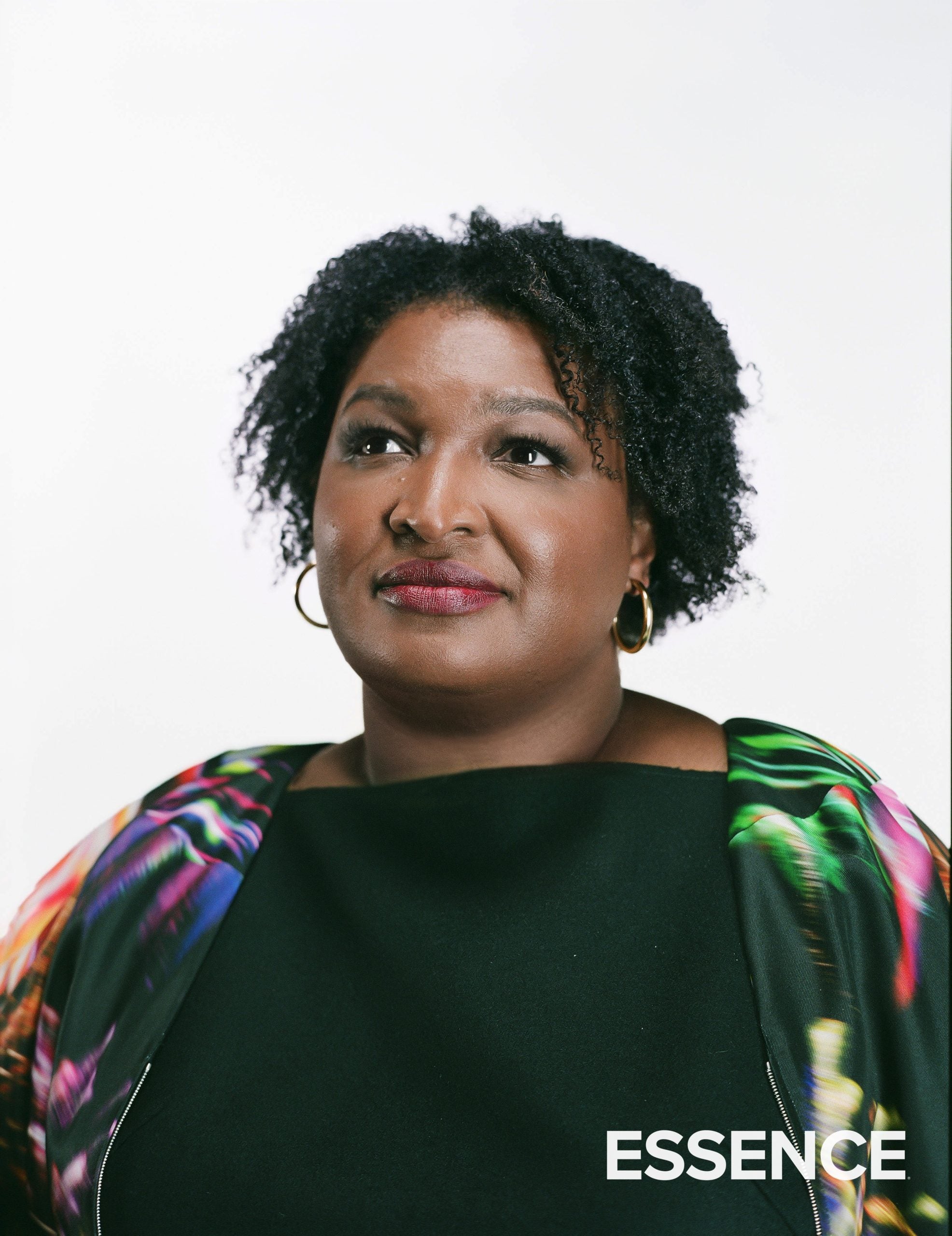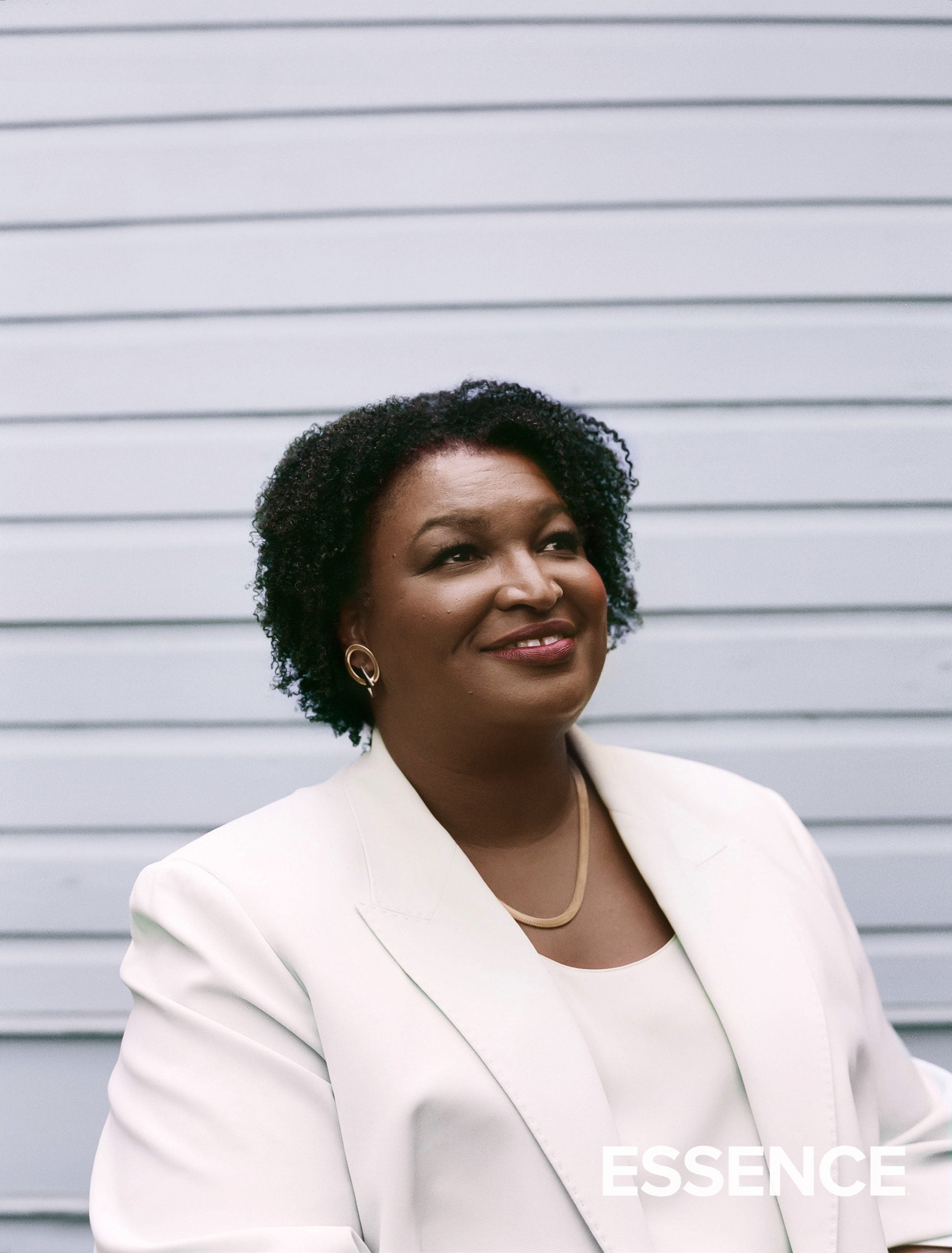
Stacey Abrams walks into the small office we’re meeting in dressed in a red blazer, an undershirt, and dark gray slacks. I can tell she is ready for the end of this 12-hour-long press day. Regardless of her tiredness, there’s no slouch in her walk. She moves through the world as someone who has known her purpose since before she took her first steps. Her winning smile greets me.
During my sit-down with one of Georgia’s gubernatorial candidates, I tell her I am a fellow Spelman College alumni (class of 2018) and, like her, a former community organizer. I mention this because I am showing up with my experiences and personal politics in tow. I am here to see what’s possible for Georgia. So is she.
“We must elect candidates who see us, hear us, represent us, and have a commitment to passing legislation that ensures our communities have the opportunity to thrive.”
Abrams is running to be the first Black woman governor of not just Georgia, but the first ever in U.S. history. She hopes to obtain that win by speaking to the needs of her own people. She’s not leaning on Blackness alone to win people’s hearts.
“Identity is the opening of a conversation, it is not the conversation itself,” she tells me. “I don’t want someone to vote for me because I’m Black, but I want them to understand that because I’m Black and because I’m a woman, I bring a set of experiences that are very singular. But you should also investigate who I am and what I say. That’s why I’m so transparent and why you may not like my answer, but I’m going to give it to you.”
Abrams knows she’s the only candidate who knows the Black experience like the back of her hand. Being Black often means fighting racism but also transmuting it to love your people. “We must elect candidates who see us, hear us, represent us, and have a commitment to passing legislation that ensures our communities have the opportunity to thrive,” she says. “The best predictor of what someone will do is knowing what they have done, and I am the only candidate for governor with a proven track record of ensuring that Georgians of all backgrounds are seen and heard in Georgia.”


Abrams’ belief in Black political power began long before 2018 when she first ran for governor. Some would say it goes back to college when she was a young Spelman undergraduate, but Abrams references her childhood to speak about her first understanding of community care. “My parents had three tenets they instilled in us: go to church, go to school and take care of each other,” Abrams says. “My parents taught me the value of service to others. No matter how much we struggled to make ends meet, we were taught that there was someone with less and it was our job to serve that person.”
Abrams has been ambitious since then, coming from a family with five other siblings and working class parents: her mother was a librarian and her father a shipyard worker. She was born in Mississippi, but her parents relocated the family to Georgia so they could become United Methodist ministers.
“They always reminded us that our faith should be a shield to protect and not a sword to strike down. This belief still guides me today.”
In November 2010, Abrams was the House Minority Leader in the Georgia General Assembly, and she had loads of grit. When the Assembly’s Democratic caucus elected her to the leadership position that year, she looked at the party’s loss in the state’s House of Representatives as a catalyst to flip Georgia blue.
She spent the next eight years creating local infrastructure to register voters, and she rallied for assistance. “I got on a plane and traveled around the country to meet top Democratic donors,” she recalls. “I introduced myself and said, ‘Look, I’m going to need you to invest in Georgia, because we’re going to need some investment before we believe in ourselves. I’m going to have some projects, and I’m going to need your help.’”
Those projects included the 2014 Voter Access Institute that flipped Republican counties in rural Georgia in both 2014 and 2016. She also led bipartisan legislation around policing and voters’ rights that remain in the record books today. While Abrams had a measurable impact in her state, she didn’t yet have a national reputation. That is until she sought to become the first Black woman governor in 2018.
She didn’t take the victory then, but the race fully familiarized her with Governor Brian Kemp, against whom she is running again. “The current governor in Georgia believes that mass incarceration isn’t a bad thing,” she says of her opponent. “He has eliminated or cut most of the criminal justice reform advances we made.”
But Abrams knows that hyper-fixating on Kemp’s long-standing policy goals is not enough to pull in new voters, because there is a second battle that lives in the space between Abrams and her hopeful win—a lot of Black people no longer trust the Democratic Party. Young people in particular are losing interest in a party that serves up hollow promises every election cycle. They’ve watched Black voters invest in centrist Democrats who merely perform solidarity for their piece of the pie. They’re tired of lip service, and some have checked out of the process.
“What is the most devastating response to me is when someone says, ‘My vote doesn’t matter.’ Of course, it matters. You may not win with your vote every time, but you make them work for it every time. That’s the point. If somebody’s got to work for something, they’re not going to be as mean to you as they were. They’re not going to ignore you the way they do.”
Turning Georgia blue is not all that matters. What remains difficult to navigate for many Black people is if voting is even worth it after the pandemic of 2020, ongoing labor strikes across the country, and uprisings to end the murder of Black people by the state. “What is the most devastating response to me is when someone says, ‘My vote doesn’t matter.’ Of course, it matters,” Abrams says. “You may not win with your vote every time, but you make them work for it every time. That’s the point. If somebody’s got to work for something, they’re not going to ignore you the way they do.”
There are also Black people across generations who aim to exercise power in the voting booths. The 2020 presidential election— when President Biden secured a victory in Georgia after years of it being a red state— made that clear.
A melting pot of factors made the moment possible, namely the return of more Black people to the south than we’d seen since the 1970s, a focus on registering young voters after Abrams’ 2018 loss, and the canvassing and organizing strategy of organizations such as New Georgia Project (led by the brilliance of Nse Ufot), Movement For Black Lives, Working Families Party and Southerners on New Ground.
After Abrams’ 2018 loss, she sees her campaign with fresh eyes. “I have had the most remarkable failure ever,” she says. “In not winning, I had a chance to write more. I had a chance to grow my business. I got to be on Star Trek.” But her projects beyond politics never distract her from her goals. “I want the job because I want to do this work,” she explains. Some of that work is addressing Black women voters who are often touted as saviors, while politicians don’t meet their demands. “Black women are often on the front lines of change because we are often the victims of inaction,” she says. “My campaign, my work, everything is centered on the fact that I will not wait for others to guide my salvation. I’d rather go ahead and solve the problem.”
This path has been Abrams’ dream well before she entered Georgia’s legislative chambers. “I mean, what, 29 years ago, I spoke at the 1993 March on Washington. I gave some impassioned speech about jobs and justice and peace,” she says. “That person wants me to be able to deliver it, and as governor, I can do that work.”

She has a holistic approach for voters to access resources that will finally put the lives of poor and disenfranchised people at the forefront of policy. “Our wellness comes about when we have a governor who controls the resources and the opportunity. In Georgia and across the South, Medicaid expansion is how Black people get healthcare, so we get Metformin instead of amputations,” she says, referring to the diabetes medication. “We get access to amlodipine instead of heart attacks. Black governors change our lives, and we would know that if we’d ever gotten to see it.”
Black governors can also bring change in ways that some of us would deem detrimental. I finally work up the nerve to ask Abrams about the calls to defund the police. She’s been clear that she believes that increasing the wages of law enforcement is a key to holding them accountable. She reiterates her idea to me. “I believe that we need correctional officers who are paid a living wage so they are actually doing their jobs and they’re not being shaken down by gang members. Or worse, they don’t show up to work.” The candidate has faced much right-wing criticism for being on the Marguerite Casey Foundation Board, a philanthropic fund supporting demands to reallocate funds from police to resources that meet people’s needs. She stands firm in her position on the board but insists that her alignment ends there.
Beyond her more polarizing ideas around public safety, Abrams has in-depth plans for statewide Medicaid expansion, stricter gun laws, and affordable housing that could save many from unyielding generational poverty. The heartbreak of Obama’s presidency taught many young Black people that identity is not enough to guarantee their vote. But Abrams is willing to fight to regain their support.
At the end of our interview, as I wait for my Lyft ride, I watch Abrams’ junior staffers leave to campaign. Many of them are Spelman and Morehouse alum with whom I went to school. I’m reminded of the power of our social justice roots, even while we disagree on what is most fruitful for our liberation. I am sitting with how critical it is to make politicians work for Black votes and keep their feet to the fire. Abrams is no exception.
I walk away knowing that as I internally debate my Spelman sister, she meets me with honor, honesty and rigor. It opens up more worlds of possibility than I had when I first entered the office. I leave knowing that while our eyes are fixed on differing goals, we are both simply making do with what we have.
–
Photographed by Gunner Stahl – @gunnerstahl.us
Styled by El Lewis
Makeup by Jasmine Umrani using Fashion Fair – @j.umranimua
Production by The Morrison Group -@themorrisongroup
Photography Producer: David KA
Photography Assistant: Matt Swinsky
On-Site Producer: Sinclaire Reddings
On-Site Production Assistant: Jeffery Taylor
Shot at Resonant Studios -@resonant.studios
Video: Videographers: Elton Mattis, Antoinette Morris,
Production Company:
Alyaka Productions, Inc.
Look 1
Mohair Knit Coat – Issey Miyake
Peacock Pearl Earring – Hazel Smyth from Tootsies
Shirt – Lafayette 148
Pant – Lafayette 148
Shoe – Custom made
Look 2
Blazer – Lafayette 148
Shirt – Lafayette 148
Necklace – Stacey’s own
Mohair Skirt – Jil Sander from Antidote
Earrings – Nikos Koulis from Antidote
Shoes – Stacey’s own
Look 3
Coat – Dries Van Noten from Antidote
Dress – Maison Margiela from Antidote
Earrings – J. Crew
Rings – Souk Bohemian
Shoes – Custom Made

